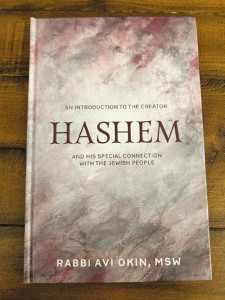
Reviewing: “Hashem: An Introduction to the Creator and His Special Connection With the Jewish People” by Rabbi Avi Okin. Mosaica Press. 2023. Hardcover. 142 pages. ISBN-13: 978-1957579665.
As observant Jews, one of our core “mission statements” is to devote ourselves daily to building a strong, deep, and meaningful kesher, connection, with our Creator.
With that objective at the forefront of our concerns, when a new sefer hits the scene, from a trusted publisher—Mosaica Press—it’s likely to pique our interests.
Yet a discerning customer will want to know a bit more about the author, his hashkafa and the style of the new book before plunging ahead, plunking down a few bucks and planning to spend quality time with the new sefer.

In the case of the just-released book “Hashem: An Introduction to the Creator and His Special Connection with the Jewish People” by Rabbi Avi Okin, MSW, this reviewer is confident that you’ll find the sefer well worth your while.
Rabbi Okin grew up in West Orange, New Jersey, attended and graduated from the Jewish Educational Center in Elizabeth, spent two years in Yeshivat Sha’arei Mevaseret Zion in Israel, then attended Yeshiva University, where he received semicha from RIETS and an MSW from Wurzweiler School of Social Work in 2018. He worked as a rabbi in Yeshiva Ohr HaChaim Academy in the Greater Los Angeles area and then as an assistant rabbi at the Nusach Hair B’nai Zion shul in St. Louis.
In the summer of 2022 he relocated to New Jersey to accommodate his wife’s placement in Hackensack Hospital to complete her work towards a PhD in clinical psychology. Rabbi Okin, his wife Devorah Tova and their two young children now live in Fair Lawn and he serves as a social worker overseeing social services, benefits and case assistance at the JCC of Washington Heights in Manhattan.
Speaking with The Jewish Link, the author shared that the seforim that had the greatest impact on him were the “Aruch HaShulchan” by Rabbi Yechiel Epstein; “Derech Hashem,” by Rabbi Chaim Luzatto; and “Orchos Tzadikim,” whose author is unknown.
In his new book, Rabbi Okin offers a framework that readers can use to conceptualize their connection with HaKodesh Baruch Hu which, once established, allows them to more thoughtfully consider questions of emunah and bitachon. Chapters in the book look at topics like “Upon What Should Our Relationship With HaShem Be Based?” “Who Is Hashem?,” “What We Believe about Hashem,” “Our Perception of Hashem,” “Understanding Hashem’s Anthropomorphisms,” “Loving Hashem,” “Relationship Case Studies,” “The Future of the Relationship,” and more.
As Rabbi Okin explains in the preface to his new book, “There are two major goals for this sefer: gaining a better understanding of some of the fundamental concepts of Jewish thought and appreciating how these ideas can enhance our relationship with Hashem.” In pursuit of these objectives, he draws on a broad array of citations from across our mesorah, noting, “I have included almost 500 sources to demonstrate that these ideas are not my own novel ideals, but critical concepts of Judaism.”
Asked what question about emunah in Hashem he finds most troubling, Rabbi Okin responded that it is the concept that troubled Moshe Rabbeinu and many other leading Jewish thinkers through the ages—the idea of Tzadik V’Ra Lo, Rasha V’Tov Lo, the fact that righteous people suffer and the wicked appear to live in tranquility. He said: “This is a very emotional question. And people ask this often. Why can life be so hard? Why must I face such serious issues?”
The rabbi shared that he heard this question from congregants in St. Louis and from clients of the JCC in Washington Heights. “It’s the same visceral, emotional question. Why? I’m a good person—why did Hashem allow this to happen to me?” He believes that everyone grapples with this question at different points in their lives.
In his experience, young adults in observant communities often grapple with the questions in emunah of “What is this life about? And what is my place in it?” Older adults will struggle with the understanding that Hashem is running the world, yet,“What does this mean? And why do certain things happen?”
One perspective that Rabbi Okin has found helpful, both in his own life and in counseling others, is the concept of “Imo anochi b’tazara, I am with you in suffering” (Tehillim, Perek 91). A traditional view is that this verse refers to Hashem, who sits by someone who faces a difficult trial. Another more contemporary view is that this verse refers to the community of the person suffering, whose members each face their own challenges. The community must work to face these challenges together, as a community, while recognizing that Hashem is part of the solution.
It is issues and perspectives like these, and others, that the author addresses in his new sefer.
In previewing the sefer, this writer found two other noteworthy aspects that add to the appeal of the book.
The specificity of the “Acknowledgements” section make it clear that the author embodies a clear and consistent sense of hakarat hatov—for all those who have aided him in his growth in Yiddishkeit and have inspired him in the work of producing this sefer.
In addition, the book is arranged in modular chapters, all less than 10 pages in length and many three to six pages long, which allows readers to read self-contained segments more easily during busy work days or other occasions where time is limited.
Admittedly, I have not finished the book yet; as it came out only this month and I got my copy within the week, that’s understandable. But I’ve already read enough to say confidently that I’m fond of the author’s style and look forward to learning from his perspective. And I’m confident you will, too.
By Harry Glazer









